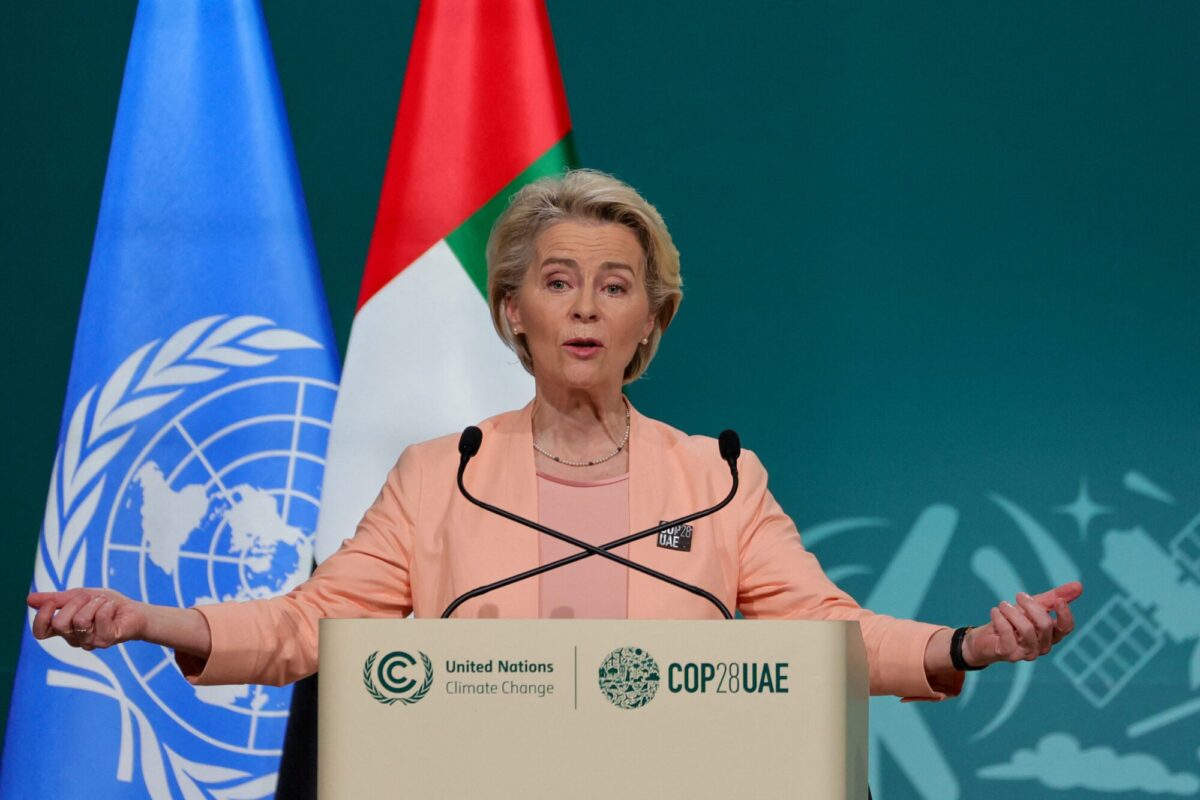
COP28, the United Nations’ largest and most important climate conference, which brings together politicians, business leaders, and climate activists from across the world, kicked off on Thursday, November 30th, in the United Arab Emirates, one of the world’s top ten oil producers.
At the gathering, set to take place over the next two weeks, Eurocrats are expected to push the bloc’s global climate agenda—opposed by increasingly large numbers of people in its member states—that seeks to phase out fossil fuels, ‘decarbonize’ the power system, and increase renewable energy capacity and energy efficiency measures, among other agenda items.
Led by European Commission President Ursula von der Leyen, the COP28 leaders launched the “Global Pledge on Renewables and Energy Efficiency,” aiming to triple installed renewables capacity and double energy efficiency measures by 2030. The EU delegation will call on states to redouble their efforts to reduce greenhouse emissions this decade and adhere to their commitments outlined in the Paris Agreement, signed in 2015, to limit global temperature rises to well below 2 degrees celsius above pre-industrial levels.
The bloc will advocate for all parties to phase out fossil fuels, ensure global fossil fuel consumption peaks ahead of 2030, and commit to the gradual elimination of fossil fuel subsidies to make sure the energy transition and carbon neutrality ambitions are realized. Commissioners will also push for the adoption of a global power system that is entirely or largely decarbonized by the 2030s. And lastly, the EU delegation wants to make sure parties are implementing policies that will ensure that global renewable energy capacity is tripled and energy efficiency is doubled by 2030.
Involved parties will also, for the first time, assess the progress made toward reaching the objectives of the Paris Agreement and identify what many leaders regard as further actions that need to be taken to achieve a ‘safer climate.’
European Commission President Ursula von der Leyen, in her opening remarks to the gathering on Friday, December 1st, expressed what she views as the urgent need to implement global carbon taxes.
“There is a way to cut emissions while fostering innovation and growth—put a price on carbon,” von der Leyen said. “The message is very clear: If you are polluting, you must pay a price; if you want to avoid the payment, then innovate and decarbonize.”
If we want to keep global warming below the tipping point of 1.5°C we need to cut global emissions.
— Ursula von der Leyen (@vonderleyen) December 1, 2023
And there is a way to do this while fostering innovation and growth.
Put a price on carbon!
Today we are here to boost this global movement. https://t.co/OjYFxFpqrs
The EU is also expected to lobby for a global tax on airplane fuel. Ahead of the conference, European Commissioner for Climate Action Wopke Hoekstra argued the tax would generate a “substantial amount of money” with a “relatively small sum” charged per flight. He said other countries, including China, Brazil, and Gulf nations, have also expressed an interest in levying such a tax.
Disagreements have already arisen among the summit’s key participants over the use of fossil fuels. On the second day of the conference, a day after COP28 President Sultan Ahmed al-Jaber argued in favor of the continued use of hydrocarbons, UN Secretary-General António Guterres said world leaders should prepare for a future without fossil fuels, insisting there’s no other way to meet climate goals.
Notably absent from the two-week summit are the heads of state from the United States and China, the globe’s two largest consumers of fossil fuels, in what perhaps is an indication that both leaders have low expectations that the event will result in any significant breakthroughs.
Biden, who attended the conference the last two years, will send former Secretary of State John Kerry, who serves as the administration’s special envoy for climate change, and Vice President Kamala Harris. Xie Zhenhua, China’s climate envoy, will also attend in place of Xi Jinping. Israeli Prime Minister Benjamin Netanyahu also opted out of participating in the conference due to the ongoing war against Hamas terrorists in Gaza. Pope Francis, who has long called for collective global action to be taken to combat climate change, also canceled his trip after reportedly falling ill.
